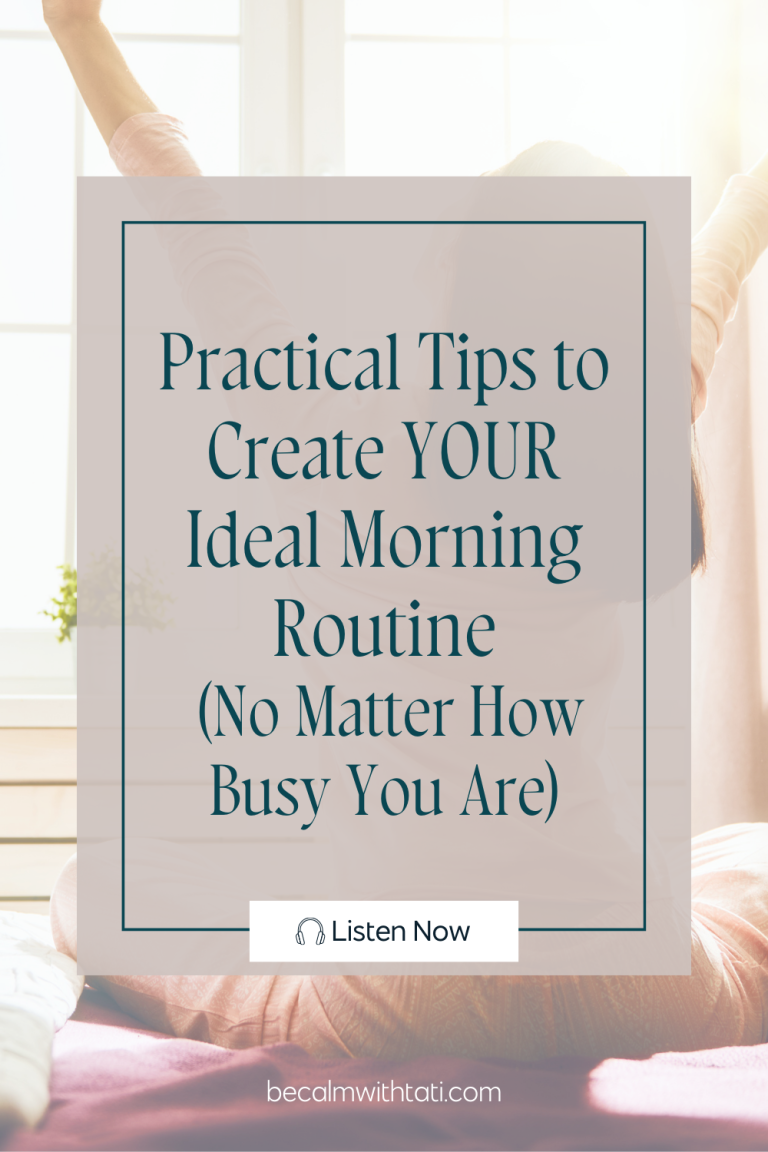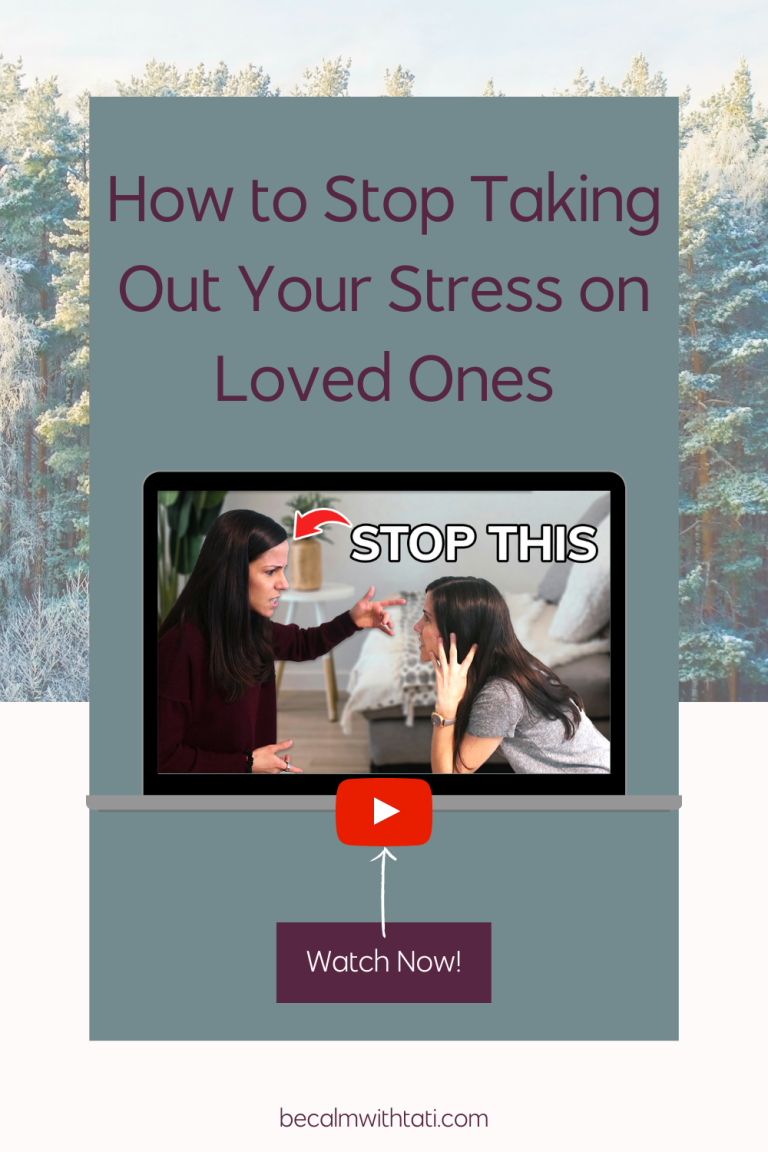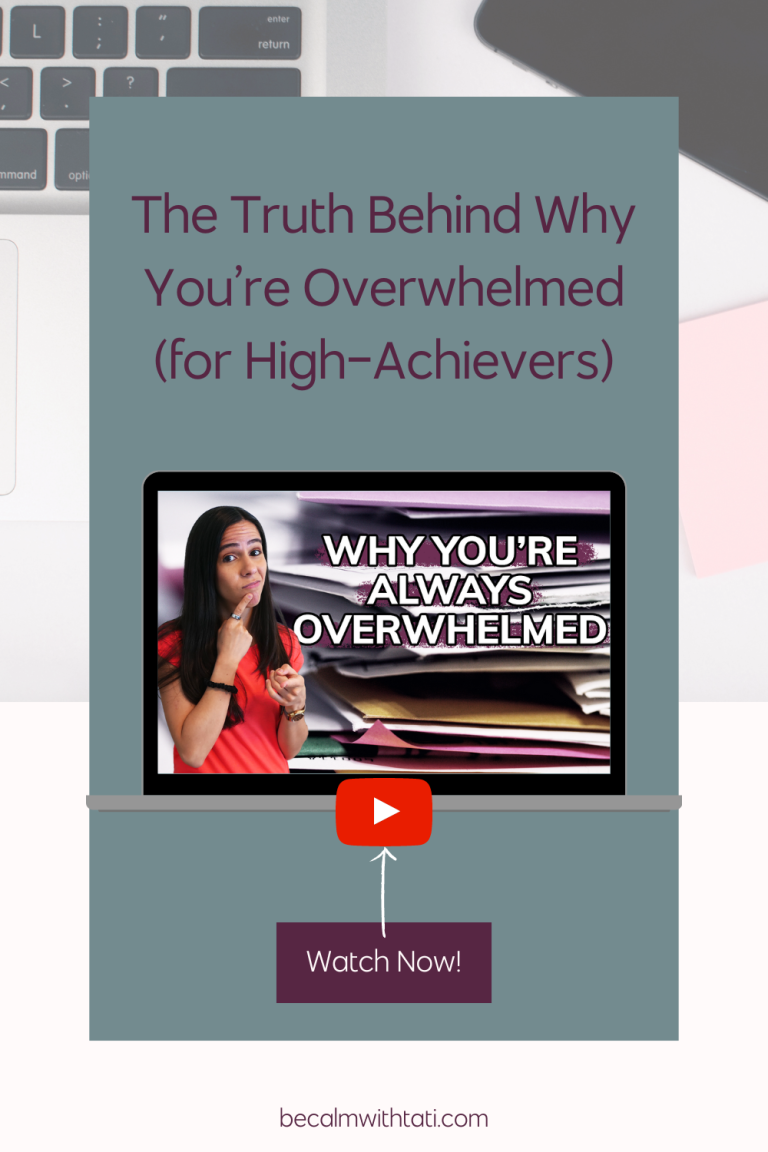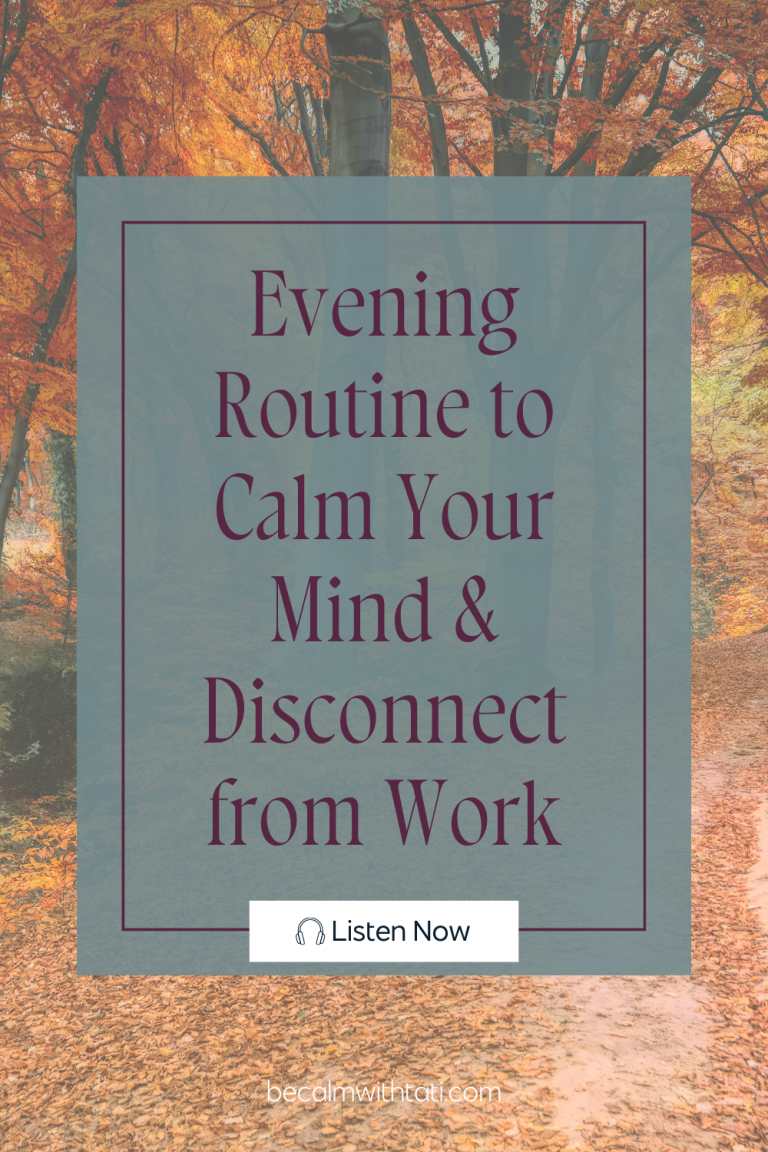In honor of the 200th episode of Calmly Coping, I recorded this episode to address YOUR questions. During this episode, I’ll be covering:
- How to deal with constantly replaying conversations in your head
- How other people can heighten our own anxiety
- How to manage high-functioning anxiety symptoms for women during their period and coping with PMS symptoms
- How to get out of the “freeze” response in stressful situations
- How to deal with big life events when your life feels out of control
- What to do when stress manifests even though you are practicing self-care
- Tips for studying psychology, if you’re interested in it!
LISTEN NOW:
🎧 CLICK HERE TO LISTEN TO CALMLY COPING WHEREVER YOU LISTEN TO PODCASTS
WATCH NOW:
SUBMIT A MESSAGE, QUESTION, COMMENT OR SUGGESTION TO THE PODCAST: Message
FREE TRAINING: Achieve A Calm Mind, Balanced Life, & Empowered Confidence in 90 Days
If you want to learn how to take back control of your life so you can feel calmer and more confident, and learn the tools to spend your time according to what matters most to you (no matter what your schedule is like right now)…

LISTEN, REVIEW, AND SUBSCRIBE TO THE PODCAST!
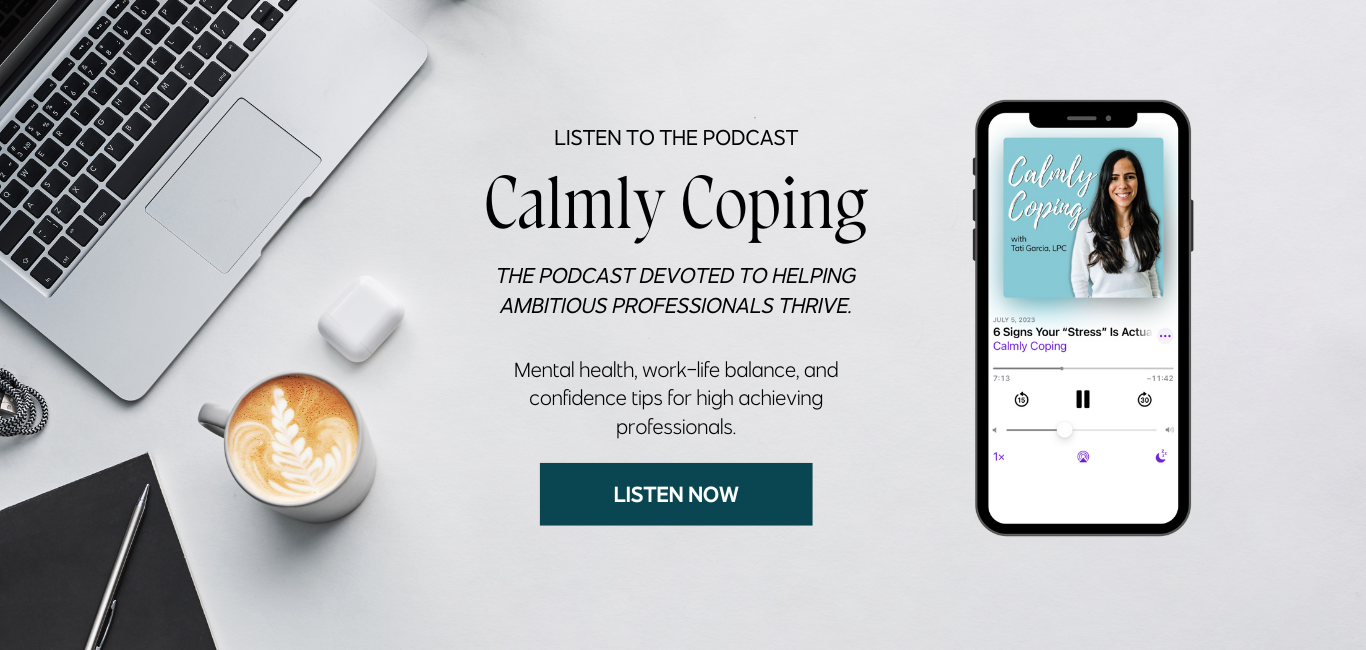
INTRO/OUTRO MUSIC: Rescue Me (Instrumental) by Aussens@iter (c) copyright 2018 Licensed under a Creative Commons Attribution (3.0) license. http://dig.ccmixter.org/files/tobias_weber/57990 Ft: Copperhead
DISCLAIMER: All content here is for informational purposes only. This content does not replace the professional judgment of your own mental health provider. Please consult a licensed mental health professional for all individual questions and issues.
Interested in diving deeper to get support for high-functioning anxiety?
I offer 1:1 coaching to help high-achievers overcoming high-functioning anxiety so they can feel calmer, more present, and have improved balance in their lives. Click here if you’re interested in learning more and getting started.
Calm, Balanced, & Confident is my comprehensive A→Z self-paced course to help high-achieving professionals overcome high-functioning anxiety so they can feel calmer, balanced, and more confident without the anxiety and overwhelm. Click here to learn more and enroll today.
Looking for ongoing support and guidance with high-functioning anxiety? The Calm & Ambitious Community is the exclusive community for high achievers with high-functioning anxiety. Click here to learn more and join us today!
TRANSCRIPT:
Click to view the episode transcript.
In honor of the 200th episode of Calmly Coping, I recorded this episode to answer your questions. During this episode, I’ll be covering how to deal with constantly replaying conversations in your head. How other people can heighten our own anxiety. How to manage high functioning anxiety symptoms for women during their period and coping with PMS symptoms. How to get out of the freeze response in stressful situations. How to deal with big life events when your life feels out of control. What to do when stress manifests even though you’re practicing self-care and tips for studying psychology if you’re interested in it.
Welcome to Calmly Coping or welcome back if you are returning listener. My name is Tati Garcia and I’m a licensed therapist specializing in helping high achievers stop overthinking everything so they can feel compounds and confident from within. Thank you so much for tuning in and thank you so much for all of the listeners, whether you listen to the podcast or you watch me on YouTube, who have been here from when I started back in May of 2020, the height, I suppose, of the pandemic. I think it was about like two months into the pandemic, but that was when I think a lot of people were starting podcast YouTube channels, and that was when I decided to start this podcast. And honestly, I know this is something that people often say, but I would not have been able to continue this and would not have continued this without you tuning in and taking your time to listen. And also to give me your feedback. Anytime I hear feedback from you, even if I don’t respond to it, I do see and read all of it. And I truly appreciate it.
And thank you so much for sticking with me and for checking out my podcast. Whether you are a regular listener or you just kind of TuneIn from time to time, I wanted to create this episode as a way of thanking you listener. And so I reached out and compiled some questions that I’ve gotten recently and will be addressing those now. So let’s just dive right into it. So first, I have a question. How do you deal with constantly playing how a conversation went or didn’t go in your head? I sometimes do this after conversations. I can definitely relate this. This is something that I used to do a lot and still sometimes do, but not as often. And 1st, I think it can help to start with identifying what is causing you to replay it because often times we don’t replay conversations for no reason. It could be because of how we are feeling after the conversation. Maybe you are feeling regretful of something you said or didn’t say, like oh, I should have said that. Or maybe you’re not sure what the other person was communicating to you or you’re overthinking how the conversation went.
So I think sometimes it can help to start with identifying why is the reason why you’re overthinking this conversation. We’re playing it over in your head, getting stuck on it, and sometimes that can help to identify the emotion. So what’s kind of underneath that? Are you feeling anxious about it? Are you feeling regretful? Are you feeling worried? Whatever could be coming up for you? And then once you have done that, then you can kind of go through the step of acceptance, accepting that replaying the conversation in your mind is not going to change anything. And anxiety makes our brains think that we just think about it enough, then we feel like we’re doing something. We feel like we’re solving some sort of problem mentally. But the reality is that doesn’t happen. So if you can acknowledge and recognize that playing this over in your head isn’t going to change what you did in the conversation, it’s not going to change how the person perceived you. You might not even know how the person perceived you unless they shared that with you because we can’t read minds. So accepting that the conversation is over,
you did the best you could in the moment, being compassionate with yourself and letting go of that. Now unless you’re choosing to take some sort of action like reaching out to the person and following up with the conversation, then acceptance and letting go is often the only way to go. And sometimes there can be those urges to reach out and clarify things. I often find in my personal experience, these urges are just coming from a place of feeling like well I should have done this, or I should have said that, or what if they interpreted this wrong, or what if I said something weird and following up on that isn’t always necessary. There’s something that is called the spotlight effect, which is essentially the idea that we all behave as though we have a spotlight on us. We all believe that there is a spotlight on our behaviors and the things we say and the things we do. And so we think that, you know, we’re super focused on the stupid thing that we said in this conversation, whereas most people probably aren’t even noticing that because they’re more focused on themselves. Everybody has the spotlight on themselves, so they’re hyper focusing on the things they say and the things they do. And so that can help to be aware of if you’re somebody who tends to replay conversations in your head, if you’re somebody who tends to have social anxiety, that just because you are hyper focused on this thing that you did or didn’t do, doesn’t mean that other people are paying attention to that. Even if they are, you might not even know unless you ask them and if it’s something that’s already passed. There’s nothing you can do to change it and you can use this as something to learn from for next time. The next question is what are your thoughts on a person’s vibe and how the vibe they give off either heightens or lessens our own anxiety? Meaning, is there any truth to a person’s vibe and how it relates to our own anxiety? So this could be that maybe if you are sensing something from somebody, it could be maybe that is similar to other people or other traits that you’ve had maybe past negative experiences with that could then be triggering anxiety because essentially our brain learns from experience. So if you had bad experiences with somebody who was, let’s say, really critical or opinionated, then when you meet somebody who you notice those same traits in, maybe that anxiety flares because your brain is making a split second decision on, OK, what’s going on in this situation? Is this person safe? Is this person not? And so the anxiety may trigger to kind of encourage you to make a change, get out of the situation, don’t pursue the relationship with the person, whatever that could be. So I think it could be that, you know. Our brains definitely do unconsciously pick up on certain traits or things from people. However, it’s also important when we’re looking at anxiety to question those feelings. You know, sometimes we can pick up on a feeling and then our mind can run with it and we can create this entire story in our mind that may or may not be based in fact. So we may think, oh, this person is critical. So that means they’re just like my sister who is super critical and that means I can’t get along with them because of that or I need to be really cautious about what I say.
That could be the case. However, it could also be that you are kind of creating the story in your mind based on this small piece of evidence that could may or may not be true. So also the brain can be really quick to jump. And especially if you’re somebody who experiences anxiety, it’s more advantageous to be sensitive to a potential threat. And so the brain is going to tune into that way more than maybe something positive. So that can be kind of picking up on something you might not even realize. An example of the brain subconsciously picking up on things is if you’ve ever, let’s say, walked into a room and just felt that there was like an air of tension or something going on, but you weren’t really sure why, that’s your brain picking up all of this information subconsciously, like beneath your conscious awareness. And jumping and drawing this conclusion as a result. Now our brain is taking in so much information, but there’s only a small percentage of it that we are consciously processing it. So that’s what can be attributed to things like somebody’s vibe or whatever you might be interpreting from that interaction with them.
Next question is could you do a video on how to manage high functioning anxiety symptoms for women during periods? So this I think is a very important topic because if you’re somebody who experiences menstruation, has a period, goes through the menstrual cycle, our hormones shift throughout the month. If especially if you’re not on any sort of hormonal contraceptive or anything like that, it can still, you know, I’m no doctor or anything. I think it can still fluctuate, but not necessarily in the same way than if you’re not taking hormones. So my #1 tip when it comes to this is to track your cycle. So this could be using an or this could be just using a pen and paper. And what this can look like is just keeping track of symptoms. And you can definitely keep track of physical symptoms. And I also encourage keeping track of mental health symptoms and just things like if you’re feeling more anxious during a certain time, if you’re feeling more depressed or down or self critical, if you’re experiencing maybe mental fog or feeling unfocused or feeling overwhelmed,
All of the these signs and symptoms can be helpful to be aware of. Because once you have that awareness of, OK, maybe you’ve been tracking your symptoms for a few months. I think it can be helpful to start with taking two to three months and looking at kind of the trends in what’s going on and what you’re experiencing in your mind and your body. And this can help to give you a sense of what to expect and when you’re aware of what to expect, of course. Things happen, you know, may not always be perfectly what you expect, but that can help you to separate from maybe some of those anxious thoughts or tendencies or even if there is some feelings of depression present to realize that, OK, this is occurring because of the period in my cycle that I’m in. And it can help you to kind of separate and not like identify with feeling this way because oftentimes when we’re in a place of feeling anxious or feeling down, it can feel like this is never going to end. I feel like I have no control. I don’t know why this is happening.
And when you can give an explanation, that can sometimes help you to feel more of a sense of, OK, I know this is something that’s difficult right now. And I also know that it’s temporary. So that’s kind of like the first piece tracking and then being aware of what to expect when it comes to you personally. And then I think it can also help to recognize the why of why this is happening. And typically, you know, the reason people talk about and often experience PMS. What’s considered pre menstrual symptoms. There’s also pre menstrual. Dysphoric disorder, which is a mental health disorder and that is when you experience significant depression and other mental health symptoms in the one to two weeks leading up to your period. And there’s also something considered that is called premenstrual exacerbation. And so that is when maybe you have an underlying condition. So it could be a physical condition or it could be a medical condition or it could be a mental health condition that is exacerbated by the changes in your hormones. Of course, if you are feeling as though you’re experiencing any sort of severe mental health symptoms or even physical symptoms, go see your doctor or psychiatrist, gynecologist, anybody to help to give you more insight into what could be happening. And what the reason is, is that what happens, you know, in the one to two weeks leading up to your period is that that’s when serotonin levels tend to drop. Serotonin is a neurotransmitter that is responsible for your mood. And so when this drops, of course, this might make you go into a place where maybe you’re feeling more irritable, maybe you’re more sensitive to things that you normally aren’t. Maybe you’re feeling more anxious, maybe you’re returning to old coping skills or old ways of thinking about things. So that’s the why of what could be happening. And sometimes this can continue through the beginning of your period. Of course, there you may be lower energy during that time and maybe you’ve noticed that you tend to go into those high functioning anxiety symptoms of being hard on yourself. Or of overthinking things, or of really having difficulty setting boundaries or overworking, or whatever else you might be experiencing. So noticing that it’s possible that things might become a little more challenging during this time and it can help to slow down. Take it easy as much as possible and practice self compassion and realize that your body’s going through a lot of changes and it’s OK to feel this way and it’s not going to be forever. There are practical things that you can do. Exercise is one thing that is super helpful, especially when it comes to PMS symptoms, because the exercise helps to release those feel good hormones, endorphins, and other things that help to improve your mood. And studies show that exercise are as effective as antidepressants, which are used to treat both anxiety and depression and things like making sure that you’re giving your body the nutrients it needs. It can be helpful if you find that you’re more sensitive during certain times to try and reduce things like caffeine and alcohol. Of course, these are all personal. Choices and things that you can experiment with on your own.
And I can definitely go deeper into this topic. I’m kind of just scratching the surface, but if this is something that you want me to create an entire episode on, then please do let me know. You can leave me a comment if you’re watching on YouTube or Spotify and you can also send me Adm on Instagram or LinkedIn, or you can send me an e-mail at Tati at BCOM with tati.com. Next question. Do you have any advice for how to deal with big life events while struggling with OCD, anxiety, some depression symptoms, et cetera? Like my life feels so out of control and this person also said, thank you for reading this. I appreciate it. I also feel very mad when people or Google is just like get sleep, get exercise, etcetera. Like what can I do besides basic things that I already do? I definitely understand that because I think a lot of times those basic things can tend to come up over and over again and get enough sleep, exercise, practice mindfulness, etcetera, etcetera. And of course the reason is because those things can be helpful. But what if you’re already doing those things and you’re finding that you’re still struggling?
So first of all, big life events in neural can be stressful, even if they’re positive things. And that’s because our brains seek familiarity and things that feel comfortable. And so when we’re going through a change that can feel uncomfortable, it can feel like there’s a lot of adjustments that need to be made, and with change can often come increased. Stress and that is what can trigger or worsen symptoms of OCD, anxiety, depression, whatever. Anytime we’re in a period of stress, I like to kind of go back to the saying, but in periods of stress we regress. And so that means that we can regress things that can become more difficult or or mental health symptoms can become more significant, especially with something like OCD that is very attached to stress. And so you can have kind of like a flare up of intrusive thoughts or those obsessions and compulsions that go along with OCD when you’re going through a stressful period. One thing that can help is similar to what I previously shared when it comes to dealing with PMS symptoms, sometimes just having that awareness. It’s not necessarily going to make it easier in the moment, but it can help prevent you from like adding on to that stress and wondering and feeling like I’m completely out of control. I don’t know what’s happening. If you can know to expect that right when things are stressful, then certain symptoms may worsen. And so because I know that then maybe I can kind of ramp up on self-care before a big life change. Or if it’s something that’s unexpected, maybe I can be more compassionate with myself and understanding that this is happening because my body, my brain is responding to the change, the stress that is coming up now. And so knowing that, I think that awareness can help you to realize that this is temporary. This is something that’s happening for a reason, because of a big life event or because of a big change. And it can also help to have things such as echo support system, somebody to talk to when things are difficult,
somebody to vent to or just share how you’re feeling. Maybe that is a friend or a family member. Maybe that is a professional, like a therapist or coach or something similar and knowing what your go to coping skills are. So maybe that is when you’re feeling really stressed, it helps you to journal, or maybe it helps you to exercise more. You know, maybe you want to go for more walks throughout the day to get that stress out, or maybe you want to rest more and take more time for yourself. So understanding what it is that you need personally and even asking yourself, what is it that I need right now can help. And also focusing on what you can control now, whether or not you’ve made this decision to have this life change happen, the things that you can control are the way that you think about it and the way you perceive what’s happening. And so you can focus on, OK, are there any positive things to come from this? And how can I cause,
especially with all three, with OCD, anxiety and depression, the tendency is to focus on the negative. And maybe you can look back at past times when you have gone through big life changes and how you overcame that. Maybe it was difficult in the moment, but was it possible that you gained some strength or some skills from that experience and looking at it through that lens, how can you then apply that to this current situation? Next question is can you please possibly do an episode on how to handle getting out of the freeze response? Meaning I struggle to stand up for myself if and whenever I feel disrespected. I either don’t respond or I just don’t know how to properly respond, which is to say I’ll barely speak. Unfortunately. I’ve heard humor diffuses tension, but I’m not a witty person so this tip doesn’t work for me. Thank you in advance, I appreciate it. OK, great question. First, I think it can help to understand the freeze response. And the freeze response is similar to if you’ve ever seen like a deer or a Bunny. It’s usually animals that are prey when they get afraid.
Or maybe they see a car coming by. Maybe they see you walking by and they freeze. This is their way of protecting themselves and this is their way of kind of, it’s a way of like playing dead, so to speak. But we’re thinking like in the woods, if a deer freezes because they blend in with the environment, maybe they’re less likely to be seen and less likely to be pursued by a predator such as a a bear or a wolf or whoever. Do bears eat deer? I don’t think so. Whoever eats deer,
whoever’s the predator for deer. But regardless, it can also be a protective, automatic way that our brain responds if we feel threatened or if we feel in danger as a way of kind of playing dead when we feel threatened or we feel like we won’t be able to defend ourselves. And if this is something that you’re noticing is happening and wanting to change, what can help is building tools when it comes to your emotional processing when you are feeling threatened. So this can look like just the basic. Skills which many of us don’t learn and aren’t taught, which I know this was the case for me, of understanding your emotions and maybe looking back at moments where you felt threatened, How did you feel? You mentioned feeling disrespected, which is great that you’re aware of that. What else was going on for you? What kind of thoughts or emotions or anything else was coming up? And what can help in these situations is sometimes practicing guided visualization. And this is a way of kind of training your brain to go through a situation and behave in a desired way.
So for example, maybe you can close your eyes, take some deep breaths, and if it feels safe and comfortable to do so, bring a recent event to mind that maybe was at like a five to seven on a scale of one to 10. We don’t want to necessarily go through something that was really traumatizing or bring something super challenging to mind, but something that was challenging for you and maybe you regret how you reacted. Notice what’s coming up as you’re kind of playing that through in your mind. What kind of physical sensations are coming up in your body? What kind of thought? This is a way of bringing your brain through the event in a Safeway and maybe you can visualize a different response. So once you’ve gone through that, imagine how would you have want to responded in that situation? What do you want that to look like? And that can give your brain practice in working through that situation. You can also practice this in other ways, maybe with people that you feel safe and comfortable with, and it’s just the process of overtime starting to slow down that response between the trigger and then your response,
because that’s where choice lives. And if you can practice that through visualization or just gaining more emotional regulation through practices like mindfulness or just becoming more aware of and working with your emotions, then that can help when it comes to going into that automatic freeze response, you’re in a way retraining your brain for how to cope with those difficult situations. OK, next question is, I really enjoy the process of scheduling out details and getting things organized for my large family, but whenever I do then the stress manifests upon me. Not because I’m anything I’m doing worries me, it just happens. I exercise every day and practice mindfulness, and I try to have several quieter days to balance out the planning days. I’ve listened to so many of your podcasts, but I can’t quite figure out how to keep the stress from starting up with me. Any tips or specific podcasts to listen to would be totally appreciated. Great question. I think one thing that can be helpful is reframing the way that you look at stress. You said then the stress manifests upon me.
Stress can absolutely be something that is harmful and difficult. However, there is good stress and this is known as you stress. So EU stress, this is the kind of stress that is necessary to get us motivated, to get us doing things. We can kind of think of it as like energy. It’s that same way that if you’ve ever heard of reframing anxiety as excitement, anxiety and excitement are actually two very similar emotions that can sometimes feel similar in the body. And so even just the act of if you’re feeling anxious, maybe it’s something that you can reframe as excitement. Well, I’m really feeling excited. That can change the way that you relate to the feeling. And when it comes to stress, this could be something that can be helpful for you. Maybe you can reframe your relationship and kind of change your relationship with that stress. Is it possible that this is a good stress that’s kind of getting you hyped up to do the planning? Because that’s something that maybe requires more mental effort or energy, more focus, and so you need that stress in order to get into that state of mind.
I think that kind of mindset shift can sometimes be helpful. And the thing that differentiates that good stress from bad stress is bad stress is maybe we feel threatened. There can be a lot of negative thoughts associated with it. Even the act of seeing, OK, this is the good stress, it’s getting me hyped up for this. It’s getting me motivated for this can help you to replace those potential negative thoughts of why am I still getting stressed? I shouldn’t be feeling this way. Additionally, difficult emotions are going to come up no matter how healed or how much work you have done because that’s a part of being human. And difficult emotions can be helpful for us to understand ourselves and how certain things affect us. And so when we see all kind of difficult emotions, as bad as I shouldn’t be feeling stressed, I shouldn’t be feeling anxious. That’s the human default. We want to go away from things that are unpleasant. However, when we push those things down and say well something’s wrong, that I’m still feeling this way, then that often actually creates resistance when it comes to handling the emotion and can keep it sticking around longer.
So you can acknowledge it, see that, you know, I see you stress. I know that you’re here and I know that you’re here to help me to get the things done that are important to me so that I can feel more productive, more clarity in my days. But that’s a great question. All of these questions are great. And I have one more. It is a voice message. Hi, Daddy. My name is Ollie and I’m from India. Actually I have, I’m 40 years old but recently I have discovered that I have an interest in psychology and mental health because I went through all this in recent past. So can you just guide me if I can do a course in psychology or mental health at this time? So here’s the thing, it’s never too late to get started. If you’re somebody who’s interested in maybe pursuing a new field or studying psychology, learning more about psychology is something that can be super enlightening. It can help you to understand yourself better. It can help you to understand human behavior in general better.
And I can’t speak specifically to programs that you might go to or things like that because that’s all personal depending on your location. But if it’s something that interests you, then you can also kind of gradually go into it. Maybe that looks like reading books about it or doing research on programs. Maybe that looks like starting part time. And also it can help to look at is this something that you’re studying for your own interest? Is this something that you’re studying for career purposes? Because if you’re looking to do something like being a therapist, like I am a mental health professional, then that often does require a graduate degree. So if you’re going for, let’s say, an associate’s or a bachelor’s degree, just knowing that there could be higher education that’s necessary in order to go after studying psychology. However, there are many things that you can do and many jobs and positions that you can also do with a bachelor’s degree. So part of that can include researching what is your end goal before you’re going into a program.
I hope that’s helpful. That’s kind of like. Few small tips, but thank you so much for everybody who submitted a question, for everybody who listens to the podcast, and for whoever is still here with me. I really appreciate your time and your feedback. If you want to send a message to the podcast, you can go to calmlycoping.com/message and record a voice message. You can leave a comment or suggestion or anything that’s on your mind and it would really help me out if you could leave a review wherever you listen or watch. So maybe that looks like liking this video if you’re watching on YouTube and subscribing, leaving a comment if you’re watching on Spotify, following and leaving a rating and maybe leaving a question if you’re listening on Apple Podcasts, leaving a review there, and wherever else. All of your feedback really means a lot to me, and it really helps to support me continuing to make this podcast. While you wait for the next episode, I have other episodes about calming your mind, improving work life balance, and feeling more confident from within. Thank you so much for tuning in today, and until next time, be calm.


Until next time…




